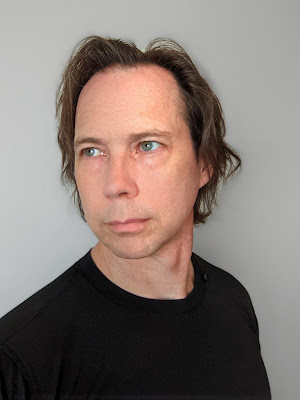In the summer of 1987, Brood 10 of the 17-year cicadas hatched, crawled through the earth, and filled the air with their screams as they swarmed in their brief, frantic lives. It was deafeningly loud. When you drove anywhere, the windshield of the car would soon be spattered with the sticky remains of the bugs. Their dead husks crunched under our feet. It was strange and disturbing, but became just one more part of the summer.
I had just graduated high school. My friends and I spent our first weeks out celebrating, excited about heading off to college, and feeling like we were one step closer to adulthood.
On the morning of July 4, 1987, I was sitting in the kitchen finishing breakfast when the telephone rang. It was my friend, Carol Williams. Her voice trembling with horror, sadness, and shock, she told me that our friend Amy Edgerton was dead.
 |
| Amy Edgerton |
And suddenly she was gone.
Just a few weeks later, Wally Judd -- another high school friend, a musician I had played with, was killed by a drunk driver.
These deaths -- the first of people close to me -- were a terrible shove into adulthood. We weren’t indestructible, life was precious, fragile, and short, and there was no sense to any of it.
Over the coming decades, I would lose more friends to illness, misadventure, and the challenges of living. Shock eventually gave way to resignation.
The pandemic has been particularly rough. In the last 2 years, I have lost 4 friends to suicide. A fifth tried, but mercifully survived.
35 years later, it is again summertime. The 4th of July passed, and I had lunch with a friend from high school. We reminisced about Amy, and I found myself crying in the car on the way home.
This past Thursday, I received an email. My friend Dean Williams died unexpectedly this week. Dean was 45. He was the funniest person I knew. Big-hearted and kind. Hard-working and an entrepreneur. He was also an incredibly talented musician. I had known him for nearly 20 years, meeting through the internet music group Chill Productions. Dean leaves behind a wife and 4 year old daughter, and many grieving friends.
I was overcome with sorrow at the news, sobbing uncontrollably over the last few days.
That expression of grief is still new to me. I have difficulty accessing my emotions at times. For many years, I thought this meant all of these losses didn’t really mean that much to me. It turns out I was wrong, and all that grief has been packed away in my mind, my heart, and my soul, waiting until I was ready to deal with it. Or at least less unready to.
The deaths of my friends over the years, particularly the recent suicides, has given me new respect for experiencing loss, for feeling the hurt, for acknowledging the holes left behind in our lives by the passing of those we love. I think it is important, as a way to honor those no longer with us, and to acknowledge their impact on us.
Nick Cave lost his son in 2015. About his own grief, he wrote:
It seems to me that if we love, we grieve. That’s the deal. That’s the pact. Grief and love are forever intertwined. Grief is the terrible reminder of the depths of our love and, like love, grief is non-negotiable. There is a vastness to grief that overwhelms our minuscule selves. We are tiny, trembling clusters of atoms subsumed within grief’s awesome presence. It occupies the core of our being and extends through our fingers to the limits of the universe. Within that whirling gyre all manner of madnesses exist; ghosts and spirits and dream visitations, and everything else that we, in our anguish, will into existence. These are precious gifts that are as valid and as real as we need them to be. They are the spirit guides that lead us out of the darkness.
I feel the presence of my son, all around, but he may not be there. I hear him talk to me, parent me, guide me, though he may not be there. He visits Susie in her sleep regularly, speaks to her, comforts her, but he may not be there. Dread grief trails bright phantoms in its wake. These spirits are ideas, essentially. They are our stunned imaginations reawakening after the calamity. Like ideas, these spirits speak of possibility. Follow your ideas, because on the other side of the idea is change and growth and redemption. Create your spirits. Call to them. Will them alive. Speak to them. It is their impossible and ghostly hands that draw us back to the world from which we were jettisoned; better now and unimaginably changed.
When I first read Nick Cave’s words back in 2018, I remembered something. About 6 months after Amy died, I had a dream. In that dream, Amy appeared to me. We walked together and talked. She told me not to be sad, that she was fine where she was, and that I and everybody should get on with their lives and not worry. I woke from the dream with tears in my eyes, but a sense of peace in my heart.
I think about Amy every 4th of July. With each passing year, I am sadder about her life being cut short. There is so much she never got to experience -- not just life’s various joys, but the challenges, setbacks, and tragedies as well.
If any of my dead friends would have had wise words about grief, loss, and how to handle it all, it would have been her.
--
[a version of this essay was included in the August 10, 2022 episode of Music, Mindfulness, and Madness.]








